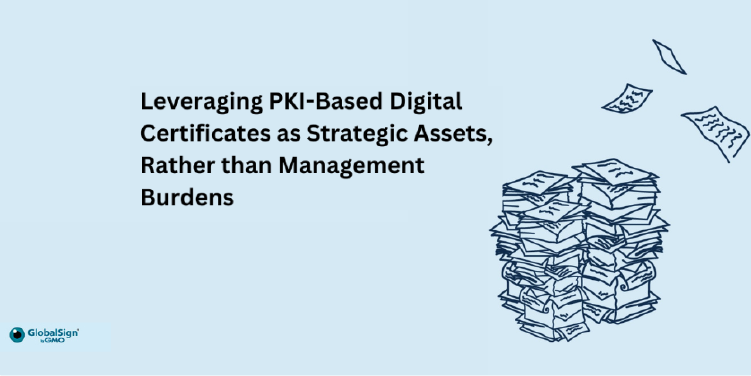
The procurement and management of digital certificates often constitutes a time-consuming manual process for IT and security teams. Trying to track the status and existence of all certificates with accuracy and timeliness can be an overwhelming task and burden. In order to fully realize the security value offered by certificates and their core technology, businesses can partner with trusted entities that can simplify and maximize the process.
Transforming digital certificates into a valuable business asset requires a strategic and proactive approach. By fully ensuring their integrity, digital certificates become a trusted asset rather than a management burden and potential liability. By leveraging advanced technologies like public key infrastructure (PKI), IT can enhance the security, authenticity, and overall value of their organization’s digital certificates.
Why are organizations hesitant to deploy the full value of PKI?
Despite the widespread use of digital certificates, IT may not be fully leveraging all the capabilities of the core PKI technology as a comprehensive cybersecurity layer. Fully realizing the potential of digital certificates involves their correct deployment for encryption, and strategic integration into a comprehensive cybersecurity strategy that addresses evolving threats and vulnerabilities.
Security and IT teams are often overstretched and can perceive added system components and alterations to their security infrastructure as just more unwelcome complexity and budgetary strain. Yet, the potential vulnerabilities and chaos of manual certificate management are fraught with unnecessary complexity, security risks, and potential financial repercussions. A proactive approach to applying the comprehensive potential of PKI processes can mitigate these negative factors.
PKI elevates security for business communications
PKI has served as a vital foundational technology essential in establishing secure communication and bolstering business security. PKI’s two-key system of private and public cryptographic keys provides IT and security teams with a robust authentication method. PKI offers broad applications in business environments to secure various processes, including online transactions, email communication, and access to sensitive information. It plays a significant role in business to aid IT and security teams in establishing a trusted foundation for secure transactions, protection of sensitive data, and a secure digital environment essential for modern business operations.
How PKI addresses common security challenges
PKI handles the most common cybersecurity challenges facing IT and security teams, such as unauthorized access and data breaches, through its cryptographic two-key management processes. Essential PKI functions provide significant business security benefits:
Encryption – Encrypted data is fully protected against tampering or interception by unauthorized entities, ensuring confidentiality and safeguards against costly and damaging data breaches.
Authentication – Authenticating the identities of users and devices with trusted digital certificates reduces the risk of unauthorized access to sensitive systems and data. PKI-based digital signatures verify the authenticity of documents and messages, which is essential for non-repudiation.
Communication Trust – Essential to businesses engaged in collaborative processes and global operations is a framework of trust when communicating over networks like the Internet. PKI ensures all identities and data integrities within business transactions for a foundation of trust.
Regulatory Compliance – PKI assists IT in meeting compliance requirements by providing a robust framework for data integrity, protection, and communication security.
The business benefits of implementing PKI
PKI offers a comprehensive framework that addresses the essential components of trust, identity verification and authentication, encryption, data integrity, transactional security, and regulatory compliance. By implementing PKI, a business can significantly enhance its cybersecurity posture. Fully utilizing the complete value of PKI can be realized as a major business asset.
The digital certificate acquisition and management process doesn’t need to create time and resource pressures. By strategically integrating processes that simplify and streamline the digital certificate lifecycle, organizations can offset these potential burdens.
PKI best practices – Automate your certificate lifecycle management
The implementation of user-friendly and efficient automated certificate management systems makes it easy for IT and security personnel to access and verify credentials. Integrating certificates with other digital tools, such as online portfolios or networking platforms, can further enhance their utility. Automated continuous monitoring and updating of digital certificates is a game-changer that will ensure their relevance, value, and regulatory compliance over time. Automated CLM provides:
- Resource and time efficiency
- Improved compliance management
- Greater accuracy and consistency
- Faster certificate acquisition and application
- Enhanced communication and collaboration
- Comprehensive digital certificate visibility
- Scalability and cost savings
Strong certificate management practices using automation can streamline the process of regular audits, timely renewals, and easy revocation of compromised certificates. Businesses can turn their digital certificate management into a simplified and strategic asset that enables operational excellence through leveraging automation.
Many businesses are exploring technological advancements, like zero-trust security models, where digital certificates play a key role in continuous authentication, thus further maximizing their potential as a proactive cybersecurity measure. Organizations can fortify their overall security posture by shifting the perception of digital certificates as management burdens to their value as dynamic security assets.
Why wait to unlock the full potential of your security infrastructure? Click here to book your certificate health check and fortify your organization’s defense against evolving cyber risks.






